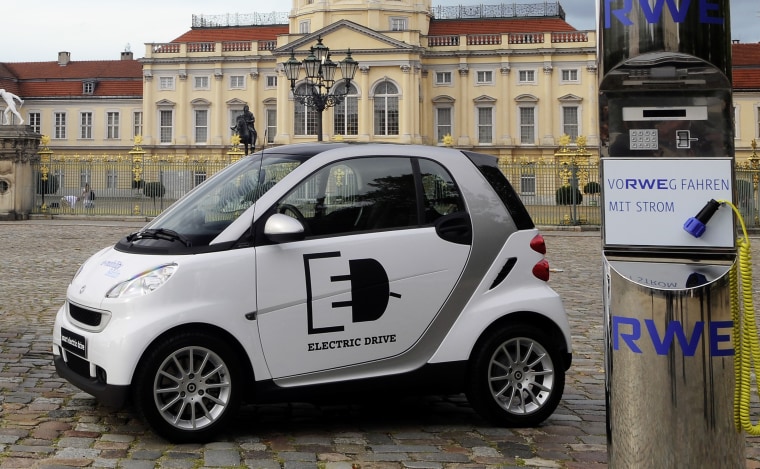Get ready for a new sound — not look — to the tiny Smart cars produced by Daimler. On Thursday at the Paris Motor Show, the company introduced its Smart ED — an all-electric vehicle that makes barely a peep.
The Smart ED — the ED stands for electric drive — can cover about 90 miles without recharging, Daimler said, adding that limited production would start by the end of 2009.
"Welcome to the future of mobility," said Nikos Aliagas, a French TV presenter who introduced the quiet vehicle with zero tailpipe emissions of carbon dioxide or smog-forming chemicals.
In a statement, Daimler President Dieter Zetsche said the company has big plans for the small car. "The future will see an ever-increasing proportion of traffic on the roads in urban centers around the world," he said. "Zero-emission electric cars could shape the image of environmentally aware cities because zero local emission motoring is no longer science fiction."
Daimler already produces a diesel Smart that it says has the lowest emissions of carbon dioxide of any production car worldwide.
Daimler has been testing an earlier version of the Smart ED in London since the end of 2007, leasing 100 vehicles to get real-world experience with electric drives.
Last month, it announced additional testing in Berlin, with the help of utility giant RWE. Daimler will test 100 EDs, which run on lithium-ion batteries, while RWE will install 500 electricity charging stations through the city.
"As the capital and Germany's largest city, Berlin is the right place for this project," Zetsche said.
Daimler also plans to use an "onboard unit" that communicates with the charging station. "Among other things, this will contribute to ensuring that the battery is automatically charged with low-priced electricity when the network is not used to full capacity, for example at off-peak times," Daimler stated.
"The development and tuning of the components needed are already well underway," the company added. "At the beginning of next year the system will initially undergo internal testing and optimization. Small series production of the electric two-seater will start at the end of 2009 and Smart will then deliver the first vehicles to selected customers."
Daimler did not disclose longer term plans. It sells Smart cars in 37 countries, including the United States since last January. And it intends to sell its two-seater Smart in China starting in mid-2009.
